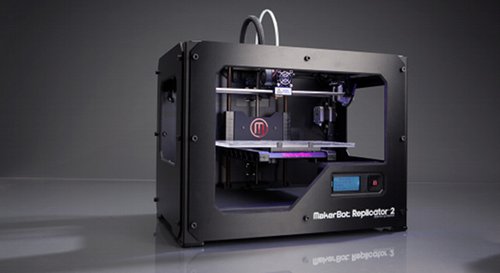Blog posts tagged predictions
Our technology predictions for 2015
At the start of the year, it’s traditional for bloggers and internet pundits to predict what will happen over the next 12 months.
Obviously, those predictions are usually completely inaccurate. For instance, at the start of 2013, one expert said 3D presentations would be a big thing.
In the same spirit, here are four things we think might happen this year in business technology. Leave a comment at the bottom to add your own.
1. Contactless payments (finally) take off
Card issuers hoped we’d all start using contactless payments back in 2012. The London Olympics were meant to be a showcase for the technology, which allows you to make payments by tapping your credit or debit card on a card reader. There’s no need to sign or enter a PIN.
Back then, consumer apathy about the tap-and-go payments meant take-up was slow.
Fast-forward to the end of 2014, and contactless was growing more quickly. October 2014 saw UK contactless payments increase 292%, year-on-year.
We expect contactless to become far more common in 2015. As the convenience factor takes hold, consumers will expect retailers to offer it.
2. Wearable technology niches grow
Although Google Glass was much-trumpeted when it arrived back in 2013, its ungainly looks and intrusive nature have held it back — arguably more than its cost, poor battery life and lack of truly useful applications. It was canned last week, to many cries of 'I told you so'.
(As the BBC’s technology correspondent discovered, you’re in real trouble if Boris Johnson is mocking your choice of face-gear.)
However, wearable technology is on the march, and will grow in many niches this year. Although these will include industry-specific applications (Google Glass can be useful in a warehouse), we expect the idea of the ‘quantified self’ to really drive wearables forward.
That means we’re predicting a big increase in the market for gadgets that measure and track what we do, how we behave, and how healthy we are. Think stress management, exercise tracking and sleep monitoring.
3. Everyone catches up with mobile
According to Ofcom statistics, 58% of UK residents access the internet via mobile devices. Yet many business websites still fail to cater for the smaller screens of smart phones and tablets.
There’s no sign of this trend reversing in 2015, and so we think this will be the year when responsive web design becomes the norm.
If you’re redesigning your website, either by doing it yourself or working with an agency, make sure you think about how you cater for mobile users.
If your website doesn’t work properly on smart phones and other mobile devices then you could be excluding potential customers from your website.
4. We learn to live with security threats
The end of 2014 was marked by one of the highest-profile IT security incidents in history. The Sony Pictures hack included A-list names, embarrassing revelations and political intrigue. It was a reporter’s dream.
But while it might have made a good story, it was just one in a long line of security breaches that made the news. Thousands of others didn’t.
The online battles between hackers, security companies and government agencies are take place largely out of sight. But as online criminals become more sophisticated, they’re beginning to target individual organisations and people rather than relying on brute-force attacks.
We think this shift will make 2015 the year businesses start thinking about security in everything they do – and get better at taking precautions to minimise the risks.
Blog written by John McGarvey, editor of the IT Donut.
The big 2014 tech predictions list: which experts have it right?

Predictions. They can be tricky to get right. We asked experts what they thought would be the big tech developments in 2011, 2012 and 2013. Their success at predicting the future was variable, to say the least.
Rob Collins was spot on early this year when he said Windows 8 adoption would be slow. On the flipside, 3D PowerPoint never gained any popularity, although frankly we’re baffled as to why anyone ever thought it would.
With the end of another December nearly upon us, this year we've asked more experts than ever what's ahead in 2014. How many of these predictions do you think will come true?
1. Advertisers pile into augmented reality
Jack Schofield writes The Guardian’s Ask Jack column. He told us that 2014 might be the year augmented reality gets a foothold:
“I think augmented reality might finally make a breakthrough on smartphones (rather than Google Glass), but mainly for advertising. If I'm right, you may hear about Aurasma, Metaio, Vuzix, Blippar, Wikitude or Qualcomm's Vuforia. One or two of these could be big.”
If you’re not familiar with the idea, augmented reality (AR) layers digital information on top of the real world. With AR, if you hold your smart phone up when you’re walking down the street, it’ll point you towards shops offering deals for you. An annoyance for consumers, or a marketing opportunity for your business?
2. More businesses use virtual teams to grow
 Francesca Geens runs Digital Dragonfly, a firm that helps independent professionals get, maintain and improve the technology they need. She told us 2014 will be the year of virtual teams:
Francesca Geens runs Digital Dragonfly, a firm that helps independent professionals get, maintain and improve the technology they need. She told us 2014 will be the year of virtual teams:
"Businesses are going to grow and collaborate more through virtual teams, which means products that allow for virtual collaboration will mature and grow.
"Watch out for the next versions of file-sharing services like Dropbox, Google Drive, SharePoint and so on — plus voice and face-time sharing tools like Skype, Lync, Google Hangouts and newbies like Sqwiggle.
"I’ll be looking for new features or services that make it easier for scattered teams to deliver projects, work as teams and develop their corporate cultures online."
If working remotely is going to get even easier, perhaps where your staff are physically located will become less important in 2014.
3. More people buy more stuff on mobile
 Roy Blanga, UK MD of group-buying giant Groupon, thinks mobile tech will extend its influence too:
Roy Blanga, UK MD of group-buying giant Groupon, thinks mobile tech will extend its influence too:
“Mobile commerce revenue is expected to reach €19.2bn in Europe by 2017 and in North America, nearly 50% of our subscribers’ transactions are on mobile devices.”
“I predict that real-time, location-based mobile targeting will be a major tech trend for SMEs in 2014, as physical and digital worlds continue to converge.
“Central to this will be the development of predictive apps that can detect consumers’ locations and reach them on the move ensuring they get the same level of service with digital.”
“For example, if customers immediately receive information, offers and deals to their mobile devices when they are in the vicinity, they will be encouraged to visit and buy from local businesses.”
4. The internet of things creates a data explosion
 Karen Tegan Padir is chief technology officer at Progress, a company that helps organisations develop applications to manage data. She says that more devices means more data — and that makes things harder for businesses trying to make sense of that information:
Karen Tegan Padir is chief technology officer at Progress, a company that helps organisations develop applications to manage data. She says that more devices means more data — and that makes things harder for businesses trying to make sense of that information:
“The Internet of Things — composed of wearable personal technology, smart consumer and medical devices, as well as connected machines and sensors located all around the planet — is about to make the challenge even greater.”
“These devices are going to ignite an explosion of new data that must be harnessed, meaning scalability and complexity will take on new meaning. Furthermore, ever improving ‘smarts’ will mean device-to-device 'conversations’ will start to become more important than user-to-user ‘conversations’.”
Hmmm. Machines talking to each other? That reminds us of an upcoming blog post explaining how you could soon be able to communicate directly with your online shopping. More on that in early January.
5. Google gets (even) smarter
Rand Fishkin is CEO of Moz, one of the biggest and best sources of search engine optimisation advice out there. He sees Google getting cleverer in 2014, employing new techniques to weed out poor websites from its search results:
“I believe in 2014, we're going to see Google continue to lean away from links and keywords as the core of its relevancy and ranking systems towards more complex signals that are harder to manipulate.
“As part of that, I see crackdowns coming for links in embeds (infographics in particular, but probably other kinds as well), for keyword-focused sites (exact match domains are an obvious example, but more broadly, sites that focus on hyper-keyword-targeted landing pages with lots of anchor text), and, possibly, for so-called ‘off-topic’ content that is clearly trying to game Google rather than provide relevant value for a site's audience.”
If he’s right, this means Google is going to further improve how it distinguishes between content people will find genuinely useful, and pages created simply to rank highly. If you publish content on your blog or website, best to keep it interesting and original. But then you’re doing that already, right?
6. The shine comes off the cloud
 Alexander Gostev is chief security researcher at Kaspersky Lab. He reckons security concerns could start to slow the rush to the cloud:
Alexander Gostev is chief security researcher at Kaspersky Lab. He reckons security concerns could start to slow the rush to the cloud:
“The cloud is facing tough times. Firstly, trust in cloud storage has been hit hard by Snowden’s leaks and the realisation that our data is being collected by various state-sponsored intelligence services. At the same time, the types of data being stored in these facilities are becoming ever more attractive to cyber-criminals.”
“Hackers are targeting cloud service employees, seeing them as the weakest link in the security chain. A successful attack here could hand cybercriminals the keys to huge volumes of data.”
Although many security experts still rate the cloud as safer than your own servers for storing data, are concerns putting you off the cloud?
7. Everyone ends up upgrading
 Santiago Alviar-Baquero is head of SMB and distribution for northern Europe at Toshiba. His prediction that many companies will upgrade next year seems somewhat obvious — so it’s probably the most likely to come true:
Santiago Alviar-Baquero is head of SMB and distribution for northern Europe at Toshiba. His prediction that many companies will upgrade next year seems somewhat obvious — so it’s probably the most likely to come true:
“Although companies are slowly and steadily drifting towards more modern and mobile technologies, we expect 2014 to be the year of the upgrade. There’s a simple reason for this: in April, we’ll see the end of support for Windows XP.”
“Businesses are going to be looking to upgrade both their operating systems and hardware. For start-up firms and small companies, this means the incentive to move to more lightweight, portable and powerful devices, such as ultrabooks and tablets, will be greater than ever.”
(In case you missed it, here’s another reminder: if you’re using Windows XP, upgrade sooner rather than later.)
8. Jetpacks. We want jetpacks!
In amongst all these serious predictions, one stood out. You can keep your augmented reality and forget about keeping up with Google, if only you’ll give us this one exciting new piece of technology. As John Eccleston told us:
“Jetpacks, surely? We've been waiting ages, and despite all the promises I've still got to use public bloody transport.”
If 2014 turns out to brings us those, you can safely say it’ll be a year to remember.
Tech predictions from previous years:
Why 2013 is the year of BYOD

He brought his own. Did you? (Image: Flickr user kodomut.)
So, we’ve finally perforated the delicate seams of a new year, torn our way through all the red tape and emerged the other side blinking bleary-eyed into the white hot future that sits before us! Well, either it's white hot out there or it's been snowing again - it's hard to tell.
You've already been hit left, right and centre with predictions for the year ahead. And while 2012 was undoubtedly the year of the cloud, the most talked-about technology for 2013 is bring your own device, or BYOD for short.
What is BYOD?
If you're not already aware, BYOD is a trend in company IT policies that allows employees to use their own technology to do their work. The idea is that it instils a better work ethic, promotes a work-anywhere attitude by allowing access to company systems remotely, and increases employee loyalty by giving staff a greater degree of flexibility in their workflow and work schedules.
It all sounds brilliant. And it is.
So what’s been holding BYOD back in 2012, and what will change that this year? Whilst the cloud was still pedalling its way to stardom, BYOD had to make some small compromises on its far-reaching ideals.
Chiefly, companies are scared. They fear that allowing employees to access company data on their own devices will lead to a security breach somewhere down the line.
Although many companies already allow staff to access their email through other devices, it's this fear that's holding most organisations back from embracing BYOD.
Get ready for BYOD
This year then, if a business is wishing to get the most of its people, it absolutely must start implementing systems that allow for BYOD.
That means ensuring that:
- Data can be managed remotely
- Data is securely backed up
- Data can be deleted remotely if a device goes missing
Fortunately, there are services available that can do this already. What's more, with the cloud garnering increasing support (the latest European Commission cloud strategy, Unleashing the potential of cloud computing in Europe is a clear sign of this) 2013 really could be the year of the mobile office, the year our work ethic is revolutionised and the year companies rewrite their IT philosophy.
One way or another, it’s going to be an exciting 12 months. What’s your stance on BYOD? Good? Bad? Ugly? Let us know in the comments.
This article was written by Rob Vicars on behalf of iHotdesk, which provides comprehensive, cloud based IT support and BYOD systems in London and beyond.
Tech that could change your business sooner than you think

3D printing: coming to your business sooner than you think?
Spotting the pieces of technology that are going to have a significant impact on businesses is a mug's game. So we thought we'd have a go anyway.
Here are four pieces of technology we think could make a big difference to UK companies in the next 12 months. We'll be watching them closely - and as things change fast in the world of tech, we recommend you keep an eye on them too.
1. Windows 8 tablets
After many false starts and a number of flawed devices, this is a make-or-break year for tablets running Microsoft Windows.
Surface Pro - Microsoft's big hope - is coming soon. Other notable Windows tablets include the Dell Latitude 10 and Lenovo's ThinkPad Tablet 2
Windows 8 is designed for touch screens, so the theory is you can have the same interface, software and files across your desktop computer and your tablet. It could be a seamless computing experience that hits iPad for six. But will it work? The next few months will tell.
2. Mobile payment systems
We mentioned iZettle last year, but since then a whole host of other mobile payment systems have arrived on the market. For starters, check out Intuit Pay, mPowa and SumUp.
Most work in a similar way: they use an app on your smart phone plus a small card reader to take card payments.
Typically promising fewer admin headaches and lower costs than traditional merchant accounts, they could be a great option for retailers, restaurants, taxi drivers, street vendors and more.
3. Mobile phones with 4G
The UK's first 4G mobile network, Everything Everywhere, got out of the blocks quickly last year. However, limited coverage and expensive data bundles have dissuaded many potential customers from signing up.
This year will be different. O2, Vodafone and Three will all be vying to launch 4G networks. The number of 4G devices available should increase, and - with luck - prices will drop as competition and coverage improve.
Make no mistake: if it's cheap enough, 4G has the potential to transform mobile working.
4. Three-dimensional printers
Ok, while we my be more than a few months off having a 3D printer in every company, these niche gizmos are on the verge of making a big impact.
3D printers let you print objects. They build them up one thin layer of plastic at a time, seemingly constructing things you can hold in your hands from thin air. This video shows you how they work.
They may not be ready for mainstream adoption yet, but the potential of these devices from companies like MakerBot and Printrbot is huge - particularly for designers who want to create prototypes quickly and cheaply.
In the future, we may see spare parts for everything from furniture to cars simply printed to order.
Our experts predict business IT for 2013
On Monday we revealed IT experts are predicting that, among other trends, 2013 will be about Mac malware and 3D presentations.
To follow up, we decided to ask two IT Donut contributors what they think this year will bring. Here's what they told us.
You'll be bringing your own device
![]() Bring your own device (or BYOD, for short). Those four words have appeared on this website again and again during the last few months.
Bring your own device (or BYOD, for short). Those four words have appeared on this website again and again during the last few months.
It's a trend that's growing and growing, with many experts tipping it for the next 12 months. Regular IT Donut contributor Craig Sharp, from Birmingham IT support firm Abussi, agrees:
"Businesses will be more willing and more technically able to embrace the BYOD trend this year."
"That's partly down to the rise of cloud services that we saw in 2012. These make it easier for businesses to embrace BYOD, because employees can connect to them with their own iPads, laptops and computers, from home and remote locations."
"Companies that decide to give BYOD a try can become more productive and reduce their costs because they don't have to buy so much expensive hardware. Most people have a computer and an increasing number have iPads or other tablets, so why not let them use this equipment to allow more flexible working arrangements?"
"I think this will create a debate about the boundaries of work. When are we working and when are we not? But perhaps that's a piece for this time next year!"
A slow year for Microsoft and laptops
 Rob Collins is technical director at Yorkshire Cloud, a firm that provides cloud services to companies from its base in Harrogate. He thinks smaller companies would do well to pay attention to Microsoft's fortunes this year:
Rob Collins is technical director at Yorkshire Cloud, a firm that provides cloud services to companies from its base in Harrogate. He thinks smaller companies would do well to pay attention to Microsoft's fortunes this year:
"I think Windows 8 adoption will be slow, especially compared to Windows 7. Its interface has been designed to work well on touch screens, but reviews have criticised the way it functions on non-touch screen computers, which is what most companies have at the moment."
"Likewise, Microsoft's Surface tablet will be a lukewarm success. It's hard to see it mounting much of a challenge to the iPad, and I think people will dislike the current model because it runs a cut-down version of Windows."
"Surface Pro should be available soon. That'll run the full version of Windows, but even if it appeals more to businesses, I suspect most employees will still prefer to use iPads."
"At the other end of the market, we'll see a surge of low cost, high performance tablets going on sale. Many of these will run Google's Android operating system. These will seriously erode laptop sales."
That's what our experts think. But what IT will you be paying attention to in 2013?
3D PowerPoint? 2013, you'll have to do better than that

You'll soon need these for every presentation. (Image: Matt Neale on Flickr.)
At the start of the year, it's traditional for IT pundits to give their predictions for the twelve months ahead. This week, we'll be publishing some of them here.
Here are three to get us started. You can also see what we came up with this time last year.
1. More malware, even on Macs
"2013 is likely to see a marked increase in the volume of and damage caused by cross-platform cyberattacks. These would be malware campaigns able to infect both PCs and Macs, and possibly even mobile devices."
"With vulnerable technologies such as Java and Flash being used across platforms, we’ve already seen malware capable of attacking multiple platforms and this trend seems certain to grow."
Harry Sverdlove, chief technology office at Bit9
Our verdict: sadly, this one seems pretty likely. As the number of Macs and mobile devices in the workplace increases, so will the efforts hackers put into targeting them. Probably as good a reason as any to stop searching for pictures of Emma Watson.
2. PowerPoint will get more interesting
"We’re all pretty accustomed to seeing films in 3D now, but this technology is yet to make its mark in the workplace. With 3D projectors now available for business, video content in business presentations could really get a lift in 2013."
"Last year, a study found that people are 29 per cent more attentive when watching a 3D film than a 2D version so it will be interesting to see how much more engaging business presentations and training can become with 3D capabilities."
Neil Colquhoun, business sales director at Epson UK
Our verdict: no chance. If 3D couldn't distract from the plot holes in Prometheus (warning: spoilers) then how on earth is it going to liven up your average business presentation? Besides, can you imagine doling out 3D glasses before your next sales pitch? Reminds us of how not to use PowerPoint.
3. Everyone will start bringing their own
"'Bring your own device' (BYOD) was arguably the biggest buzz phrase of 2012. It's now an unstoppable, user-driven wave which will continue to make a major impact on the IT world in 2013 and beyond."
"Smartphones, tablets and laptops all come under this category, as well as desktop PCs used remotely from home."
Ian Kilpatrick, chairman of Wick Hill Group
Our verdict: BYOD is happening everywhere already, driven by employees who are using their own devices no matter what their bosses want. It's a safe bet this will continue, though if a high-profile case of data loss hit the news then that might cause some companies to think twice. Better get to grips with BYOD then.
We'll have more business IT predictions for you later this week. But in the mean time, what are you expecting from 2013?
Why smaller businesses are best placed for technology change
Against the backdrop of a challenging economic climate and unpredicted social and political upheavals, the need for agility and flexibility in business is paramount. Accompanying this turbulent environment is a tidal wave of technology change. It’s having an impact on every aspect of businesses operations, from the boardroom to the shop floor.
These trends are fuelling an unprecedented change to the way businesses and employees operate. And many organisations aren’t ready to adapt to the future workplace.
A power shift away from management
Recent Ricoh research – conducted via the Economist Intelligence Unit – demonstrates how power is shifting away from the traditional management hierarchy. This research found that 63% of business leaders are predicting that business decision-making will shift towards individual employees, as businesses move towards a decentralised structure by 2020.
Although lacking the financial resources of bigger companies, smaller businesses could find themselves at an advantage in this scenario. Their size and nature means they’re more likely to have a cohesive, collaborative management structure where the best ideas can rise to the top and be implemented into everyday operations.
Likewise, SMEs often have a more flexible approach to technology adoption. Having a smaller workforce makes IT innovation more commonplace. For instance, it’s easier to take an individual approach to IT provision, giving each member of staff access to the technology they’re most comfortable with.
Democratic data access
It is, however, difficult to shift decision-making to employees if they do not have access to the data and documents they need to take action. So if your business really wants to get ready for employee empowerment, you may need to rethink how your document processes work. The aim is to ensure important information is shared flexibly across your whole company.
The research also points towards a new, more collaborative approach to product and service development. Nearly 86% of business leaders agreed that project teams will typically include people from outside the organisation like customers, partners and communities.
This adds weight to the argument for shifting towards a connected business model where all these parties are linked and able to communicate effectively so they can develop the brightest ideas.
Despite the challenges that lie ahead, there’s a great opportunity here for companies willing to implementing more collaborative technologies. The tidal wave of technology change will give birth to a new generation of business success stories, empowered by customers and partners alike.
- Embrace employees who bring their own IT to work
- Choosing collaboration tools for your business
- Document management explained
Chas Moloney is a director at Ricoh UK.
2012: great for Google+, group buying and gadgets

Will 2012 be the year of Google+ for business?
Guessing what’s in store is traditional at the start of a New Year. And so I’ve been looking ahead to consider what 2012 might have hold for businesses and the way they use technology. Here are my predictions.
Considerable consumerisation
Consumerisation of IT is going to become even more widespread in 2012. This is the migration of consumer technology – like tablet computers and social networks – into the world of work.
With almost half the UK population using smart phones and tablet computers becoming increasingly popular, demand to access business content on a range of devices will grow exponentially. The line between consumer and business use of technology will become increasingly blurred as workers expect to be able to access work email on their personal devices - and vice-versa.
Google+ growth
We’ll see an increased adoption of Google+ as a new way for businesses to reach key customer groups. Facebook is not always the right marketing channel for a business but Google+ has the potential to bridge the gap between social and professional.
Small businesses have the flexibility to be amongst the early adopters of new tools like Google+ and so should capitalise on the opportunities they can bring.
Happy huddling
If 2011 was all about the growing popularity of discount sites like Groupon and LivingSocial, 2012 will see more and more companies looking to services like Huddlebuy - the small business equivalent of Groupon.
These services enable small businesses to boost their presence, acquire new customers and ultimately increase sales. The offers are widely promoted and generally very well received - so they can provide a great opportunity for small businesses.
Finally, the use of QR codes will continue to grow. We’re already seeing these pop up everywhere: in magazines, on groceries, adverts and so on. They provide yet another avenue for customers to interact with a business, giving smaller companies a voice in crowded markets.
More articles looking ahead:
- Tech trends for 2012
- Changing technology that could influence your IT strategy
- How to provide the IT your staff expect
Andrew Miller is technology marketing consultant at Dell.
How did our 2011 tech predictions turn out?

We gazed into our crystal ball this time last year. (Image: Frogman! on Flickr.)
Regular readers might remember that about a year ago we asked some of our IT Donut experts what trends we'd see in small business IT in 2012.
Twelve months on and we figured it would only be right to tot up the scores and see how accurate our experts' predictions were. So, how did they do?
Prediction one: it'll be easier to run your business using free services
Paul Lewis from Moo told us he thought we'd see more useful 'freemium' tools appearing in 2011. These are services like Dropbox and Huddle which offer useful, basic features for free and then charge if you want to access additional functions.
Even a year ago freemium services were fairly common. The idea has been around for a good few years, ever since the term was popularised by author and Wired magazine editor-in-chief, Chris Anderson.
Freemium services go hand-in-hand with cloud computing, because many cloud services follow the freemium model. As cloud computing has grown in 2011, so have the number of useful, free tools available. We rounded up five of the best a couple of months ago.
Verdict: there's a greater choice of freemium services than ever before, but most businesses are a way off being able to do everything for free. 8/10.
Prediction two: Quora to be the social media star of 2011
Tech and PR blogger Phil Szomsor reckoned question and answer social network Quora would prove its worth to businesses as a PR and customer service tool.
But after an initial burst of publicity, Quora seems to have faded somewhat from view, even though it does have an active community of users. In particular, questions about starting and running a company seem to attract a lot of answers - suggesting Quora can be a valuable source of advice for business owners.
But the site also attracts more trivial questions. That's no bad thing, but suggests perhaps Quora will find a niche as a kind of giant Notes & Queries.
Verdict: Quora has become a good place to go for business advice, but it's nowhere near as widely used by companies as other networks like Facebook and Twitter. 5/10.
Prediction three: potential customers will expect an instant response
David Hill from Cloudnet Telecommunications said he thought potential customers would get more impatient in 2011. Driven by the growing use of smartphones and expecting immediate responses through social media, he reckoned businesses would have to get better at providing the right information to customers at the right time.
He's certainly right in that a growing proportion of people are using smartphones while out shopping to look up information, compare prices and research products. A recent survey found that 24% of consumers have used a smartphone while shopping - often to check product details or competitor prices.
And email guru Monica Seeley confirms that we've become accustomed to getting near-instant replies when we send emails - which makes David's prediction look fairly accurate.
Verdict: better mobile internet access means more people expect they should be able to look up the information they need, immediately. 7/10.
Prediction four: you won't pay for software in one lump sum
This prediction had a clear connection to cloud computing too. Ciaran Kenny, from IT support firm Macnamara, told us that the traditional model of paying for business software all in one go would become less popular. Instead, companies would start to pay for software on a subscription basis.
Certainly, subscription software has gained ground since Kenny's prediction. Most notably, Microsoft launched Office 365 in June. It's a version of Microsoft Office that you pay for by the month and access over the internet.
But have we seen the death of traditional software that's paid for in one go? Not a bit of it. Microsoft still sells this version of Office too - and the shelves of PC World aren't likely to be empty of software anytime soon.
Verdict: there are more subscription-based packages available than ever, but businesses are only slowly starting to embrace them. 6/10.
Do you agree with our assessment? And what technology has made a real difference to you this year? Leave a comment to let us know.



